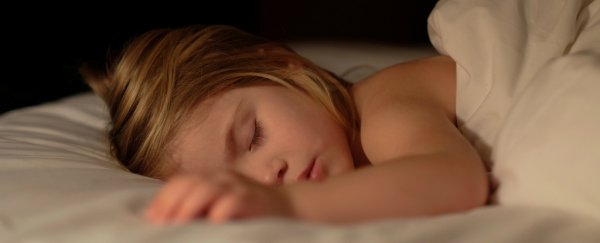An ongoing study by researchers in the US is looking to identify links between a lack of sleep in children and the development of emotional disorders later in life.
They've already found that not getting enough sleep leads to more negative emotions in kids, and at the same time can alter their positive emotional experiences too.
But the team is now trying to spot connections between this short-term emotional impact of poor sleep (such as feeling grumpy or tired in the morning), and the longer-term chances of developing depression and anxiety.
"We focus on childhood, because similar to problems with anxiety and depression, sleep habits and patterns develop early in life and can be enduring," says clinical psychologist Candice Alfano from the University of Houston.
For the purposes of the research, the team temporarily restricted sleep in 50 pre-adolescent children between the ages of 7 and 11.
Just two nights of bad sleep were enough to make the kids get less pleasure from positive things, and become less likely to recall details about positive experiences.
Alfano and fellow researcher Cara Palmer from the Sleep and Anxiety Centre of Houston are calling for more longitudinal studies to measure these effects over time as children grow older. Their own work is being funded by the National Institute of Mental Health (NIMH) in the US.
To complement their long-term study, the researchers have published an article in Sleep Medicine Reviews, looking at the relationship between sleep and emotional stability based on the scientific literature we have so far.
The paper finds evidence that without enough sleep, people are less likely to seek out positive or rewarding experiences if they require effort, and over a longer period of time the risk of depression and a poorer life quality goes up.
As our bodily systems are still developing as children, getting sleep right is crucial to overall health, the researchers say – although getting youngsters to sleep through the night is often easier said than done.
Alfano suggests parents should consider sleep as an important part of overall health, just like brushing teeth, eating a balanced diet, or getting enough physical activity.
Late bedtimes, inconsistent sleep schedules, and non-restful sleep could all be factors that may be harmful to health.
"Sleep deprivation can create a 'perfect storm' for experiencing negative emotions and consequences," says Alfano.
Alfano and Palmer aren't the only ones looking into the science of sleep in children. A review of the sleeping habits of 3,000 children in Australia earlier this year found that sleeping patterns could affect emotional and attentional development up to the age of nine.
In that study, children later diagnosed with ADHD had significantly higher levels of parent-reported sleep problems, although it's not yet clear whether these problems helped cause the disorder or were signs of underlying neurological differences from the beginning.
There's other health benefits too – a recent study published by researchers at Ohio State University found that preschoolers who are tucked in by 8pm are significantly less likely to become obese teenagers than children who go to sleep later – with bedtimes after 9pm doubling the likelihood of developing obesity later.
While research in this area is ongoing, it weight of evidence strongly suggests parents should encourage their young children to go to bed early and get a good night's rest wherever possible (and yes, we know it's not always easy!).
